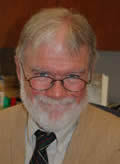
From this the poem springs: that we live in a place
That is not our own and, much more, not ourselves
And hard it is in spite of blazoned days.
Thus the inimitably haunting Wallace Stevens, in his “Notes Toward a Supreme Fiction.” In my own notes, I substitute “prayer” for “poem,” confident that Mr. Stevens doesn’t mind. Poetry and prayer are never far apart. Ezra Pound thought that as music drifted away from the dance, it became less music, and that as poetry drifted away from music, it became less poetry.
Poetry may drift away from prayer, but prayer doesn’t drift away from anything. Prayer can pounce on a poem (or a soul) unbidden as a bobcat dropping from a tree limb, all fangs and claws. Prayer is downright predatory. Prayer can pick up a sinner’s scent, silently begin to stalk, keep motionless watch for hours and patiently await the moment to leap.
Prayer knows all about sin — how it begins to debilitate a sinner immediately, how it weighs a sinner down, how its burden grows steadily, relentlessly, remorselessly. Prayer can sense a sinner’s weakening, bogging down beneath the sin’s weight.
Prayer can crouch as the sinner’s wits are slowly gathered, can register the sinner’s growing alarm, can measure the sinner’s increasing distance from the narcotizing everyday.
From this the prayer springs: That the faithless sinner sinks and cries out, like Peter going under the waves, “Lord, save me!” or any number of other things: “Oh God, come to my assistance!” or “Lord, Jesus Christ, Son of God, have mercy on me!” or simply, “Oh God!”
Sometimes, prayer is waiting for the sinner when he wakes up in the morning. The sinner is, say, standing at the sink, drawing tap water into an espresso pot and staring out the kitchen window into the olive-tinted light of the backyard. Prayer dispels the sinner’s morning stupor and invites him to utter itself. What releases prayer is this: That the morning seems suddenly alien, the sunlight seems such as the sinner has never beheld, the vibrant backyard seems no country of his, and the world around him seems suddenly a soul unto itself. And not his soul.
On such a morning, prayer may agree that the sinner will never be entirely at home here in this world, which is as sure to end as the sinner is to live forever. Prayer may remark that the sinner must nevertheless be grateful to visit and, however briefly, inhabit this place where sunlight transpierces oak leaves and make them glitter like emeralds.
Even at Mass, prayer may show up, noticing how easily the sinner can be annoyed — by the pompous homily, or by the eccentricities of others in attendance, or by the lame music — and may be obliged to administer a dope slap. “Remember that you are members of one another,” prayer may hiss in the sinner’s ear, “all drawn here by the One dying for you on the altar. Be still. Be awed. Be grateful. Be saved.”
In near despair the sinner may discover that prayer was with him all along. Suppose the sinner’s memory unreels a litany of shames and accusations. The soul of the sinner broods, frets, convulses and roils, and the treacherous waves surge up all around before the sinner notices a silent passenger, prayer, asleep in the perfect storm. Awakening, prayer speaks to the storm, “Be still,” and so it becomes. To the sinner, prayer says, “Wake me a little earlier next time.”
From domestic camouflage prayer may erupt, like the roared greeting of guests at a surprise party. After a fine dinner and much wine, for instance, as the sinner is belly-laughing with his wife and dear friends of theirs, he may notice prayer at table with them all, smiling broadly. “Rejoice in this bright glimpse, this foretaste,” prayer might seem to say at such times. “Rejoice in the mirth of saints. Rejoice in the joy for which I made you.”
To which, of course, the sinner gives the only conceivable reply.
Amen.
Michael Garvey is Notre Dame’s assistant director of public relations. Email him at garvey.2@nd.edu.